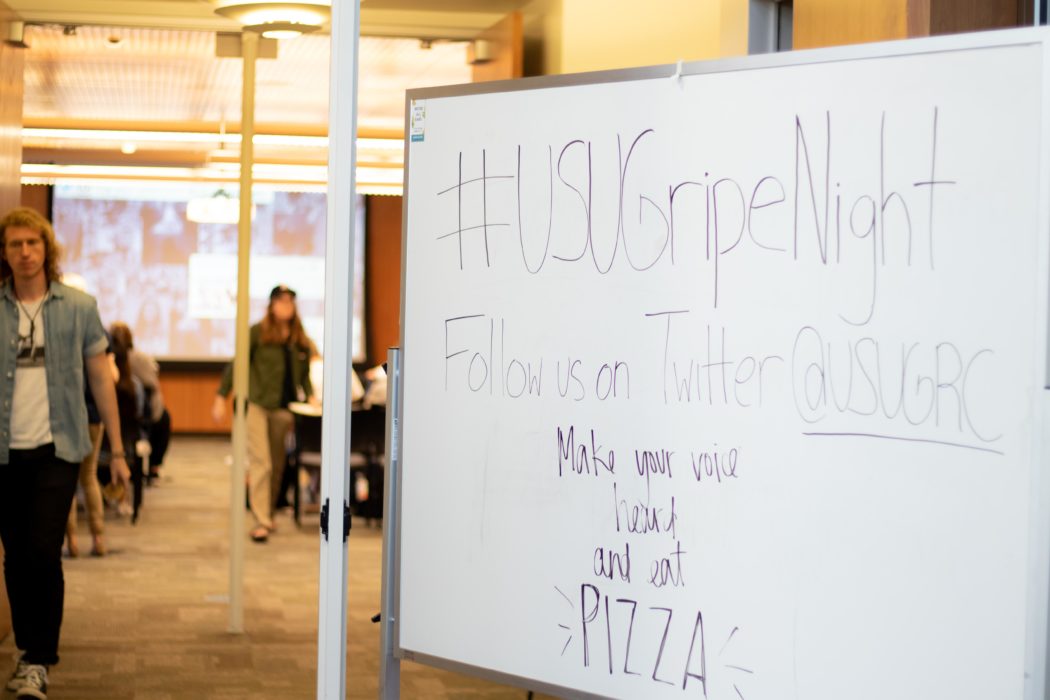Diversity, inclusion and lack of support from the city among the many issues brought up at second-annual ‘Gripe Night’
IDEA Course Surveys aren’t accessible enough. The university doesn’t offer enough variety in dining options. Student fees designated for athletics are too high.
These were some of the many complaints brought up at the second-annual “Gripe Night,” an event hosted by the Utah State University Student Association Government Relations Council. Students were encouraged to “voice their concerns and gripe about what they think is going wrong,” according to the Facebook description of the event.
Participants were encouraged to either tweet “gripes” tagged #USUGripeNight or take the stand at a podium inside the event and complain to the 2018-19 USUSA student advocate vice president, Sam Jackson, who leads the GRC and moderated the event.
While complaints ranged from tuition hikes to parking to inclusion, one of the most notable gripes came from Skyler Morrise, a transgender student.
Morrise began his transition about a year ago. He lived in Richards Hall at the time, where he said his female roommates were supportive of his transition. He then stopped taking the hormones required for transitioning and began them again last November.
“I knocked on my roommate’s door and said, ‘Hey, I’m going on this medication to transition, so I’m going to look different and sound different,’ and she was like, ‘That’s cool, you do you,’” Morrise said.
He later received news, however, that this wasn’t the case.
Morrise said his resident director emailed him and explained that his roommate had complained about living with someone who was transgender, which Morrise said took him by surprise.
“It’s hard to go to college for a semester and not really know how your housing is going to turn out because of discrimination or because someone is maybe uncomfortable,” he said.
Inspired by his situation and in hopes of speaking up for others, Morrise suggested more housing protection for those with opposing views, and potentially even housing specifically for LGBT people.
“People are kind of shooting themselves in the foot because they have to just play where they’re living by ear,” he said. “There needs to be extensive policy about housing placement for transgender people and maybe even transgender-specific apartments.”
Several minority students also discussed the need for better diversity training and support from the university for multicultural events.
Ali Mahamat, who recently graduated in international studies and served as president of the African Student Association, remembered receiving emails from different university departments asking his group to perform at different events or participate in photo-shoots.

McKenna Allred talks a about class registration problems.
Mahamat said he didn’t mind these requests, but he felt the university only supported multicultural clubs when it was convenient.
“It’s like they expect us to put on big events, but funding gets cut and there’s not enough support,” he said.
Mahamat added that he felt USU was “just seeing us as talent or possible recruitment to get more people of color here” instead of “actually seeing us as students…showing that the university cares.”
Several students mentioned the recently-discussed housing ordinances from the city, which they felt unfairly targeted students.
“I don’t know why there isn’t more support from the university with what students are facing with the city,” said Nadir Tekarli, a senior studying economics.
And while many concerns were related to social issues, several students discussed academic qualms.
Brayden O’Brien, the 2017-18 GRC director, shared a story in which one of his favorite professors did not receive tenure, though his colleagues and students thought he should have. O’Brien was confused about the decision, and suggested a more transparent process for deciding on professor tenure.
“I think students should have a little more say and a little more input about the tenure process,” he said.
McKenna Allred, the newly elected USUSA senator for the College of Humanities and Social Sciences, took issue with the lack of organization in the pre-planned registration process.
“It’s really frustrating when you’re trying to make a plan for registration and not all the courses are there,” she said.
More information on USU’s Government Relations Council is available at http://grc.usu.edu/
@alison__berg

